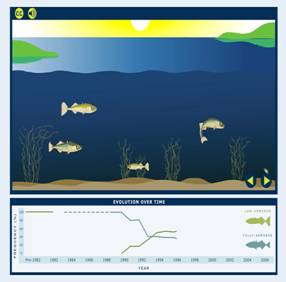NSF Grant Supports New Tools for Teaching Evolution
In collaboration with the University of Utah’s Genetic Science Learning Center, Project 2061 has received a two-year exploratory grant from the National Science Foundation to develop a plan for an innovative curriculum unit to help high schoolers understand core ideas about evolution and data analysis. Despite the importance of evolution to the study of biology, research has shown that many students have a poor understanding of the topic resulting from pervasive and persistent misconceptions about natural selection and genetics.
The new unit will be designed to address students’ learning difficulties by engaging them in collecting, analyzing, and arguing from scientific data that provide evidence for common ancestry and illustrate the links between genetic variation in traits and natural selection. With its focus on core ideas in both science and mathematics, the new unit will respond to a key recommendation of the National Research Council’s Framework for K-12 Science Education. It will also serve as a model for integrating the three dimensions of science learning—disciplinary core concepts, cross cutting themes, and scientific practices—that are emphasized in the Framework. For example, students will draw on knowledge from all three dimensions to develop their own evidence-based explanations for phenomena related to heredity and natural selection.

- This is a screen shot from an animation developed by GSLC that lets students observe how a modern-day population of stickleback fish changed from fully armored to low-armored in just 13 generations.
The Genetic Science Learning Center will take the lead in developing some prototype lessons for the new unit and will also develop interactive, multimedia, computer-based simulations in which students will be able to take on the role of researchers, collecting and analyzing data from populations in the same locations over several virtual years. The simulations will help students visualize the habitats and organisms, understand sampling processes, make measurements, and collect other kinds of data. The Center has extensive experience in the development of interactive multimedia learning experiences, and their accomplishments were recognized in 2010 with Science magazine’s first ever Science Prize for Online Resources in Education (SPORE) Award.
“This is an opportunity to move our work in some new directions while also building on our experience in curriculum and assessment design,” says Project 2061’s director Jo Ellen Roseman, who serves as a principal investigator for the new study. The Project 2061 research team will focus on developing a conceptual framework for the new unit and designing assessment instruments that can be used to evaluate students’ learning and teachers’ understanding and use of the unit. By Year 2, the prototype lessons will be ready for pilot testing in classrooms.
For more information about this project, please contact Dr. Jo Ellen Roseman, 202 326 6752, jroseman@aaas.org.
Also in the November 2012 issue:




